#labor
Text
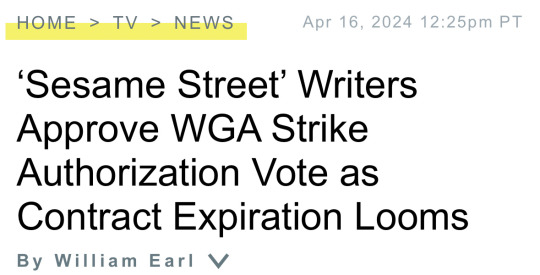

Source
331 notes
·
View notes
Note
I’m legitimately spilling tears over the last update. I am a mom, and going through labor is terrifying. Wonderful for what’s to come, but terrifying. So having it depicted in the middle of a war zone, where the outcome is unclear at best? Such a beautiful visual picture of how that experience can often feel. Maybe I’m reading super deeply into it, being 34 and all and starting to feel those experiences in a different way as I get older, but the unspoken parallels really did it for me.
And the sweet tenderness the brothers have? Just sobbing. Goodness, I am suppose to be working right now and instead I’m having a breakdown at how gorgeous this all is.
Really amazing work, Kat, I just love this so much.
And an additional side note- I am so glad you’ve been taking your time and allowing your body to heal and I’m hoping you are feeling so much better.
That means so much to me to hear! I really want to do right by all who have gone through child birth. It is both beautiful and terrifying and can still be quite dangerous even in this modern day and age. I have so much respect for those who choose to have children and I feel they’re not given the praise deserving of being absolute miracle workers.
I’m just glad to know that this little project can help put a small spotlight on just how special people like you are!
And thank you, there’s a lot going on right now so just trying to keep my head above water through it all! Just keep swimming!

#thank you I so needed this!#it’s been a rough few days#emotions suck#rottmnt replica#replica#save rottmnt#rottmnt#rise of the teenage mutant ninja turtles#Q&A#child birth#labor
181 notes
·
View notes
Text
Precaratize bosses
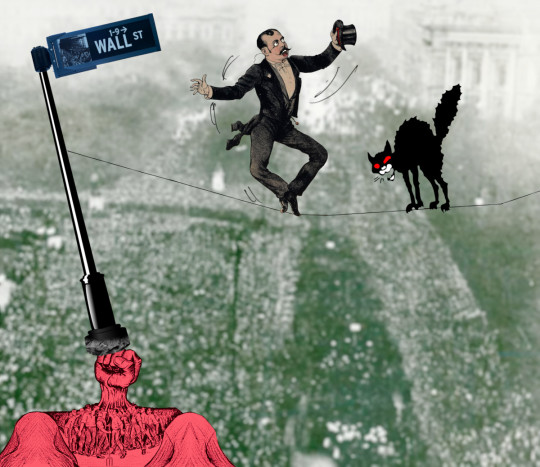
I'm touring my new, nationally bestselling novel The Bezzle! Catch me SUNDAY (Apr 21) in TORINO, then Marin County (Apr 27), Winnipeg (May 2), Calgary (May 3), Vancouver (May 4), and beyond!

Combine Angelou's "When someone shows you who they are, believe them" with the truism that in politics, "every accusation is a confession" and you get: "Every time someone accuses you of a vice, they're showing you who they are and you should believe them."
Let's talk about some of those accusations. Remember the moral panic over the CARES Act covid stimulus checks? Hyperventilating mouthpieces for the ruling class were on every cable network, complaining that "no one wants to work anymore." The barely-submerged subtext was their belief that the only reason people show up for work is that they're afraid of losing everything – their homes, their kids, the groceries in their fridge.
This isn't a new development. Back when Clinton destroyed welfare, his justification was that "handouts" make workers lazy. The way to goad workers off their sofas (and the welfare rolls) and into jobs was to instill fear in them:
https://www.theatlantic.com/business/archive/2018/03/welfare-childhood/555119/
This is also the firm belief of tech bosses: for them, mass tech layoffs are great news, because they terrorize the workers you don't fire, so that they'll be "extremely hardcore" and put in as many extra hours as the company demands, without even requiring any extra pay in return:
https://fortune.com/2022/10/06/elon-musk-jason-calacanis-return-to-office-gentlemens-layoffs-twitter/
Now, there's an obvious answer to the problem of no one taking a job at the wage being offered: just increase the offer. Capitalists claim to understand this. Uber will tell you that surge pricing "incentivizes drivers" to take to the streets by offering them more money to drive during busy times:
https://www.uber.com/blog/austin/providing-rides-when-they-are-most-needed/
(Note that while Uber once handed the lion's share of surge price premiums to drivers, these days, Uber just keeps the money, because they've entered the enshittification stage where drivers are so scared of being blacklisted that Uber can push them around instead of dangling carrots.)
(Also note that this logic completely fails when it comes to other businesses, like Wendy's, who briefly promised surge-priced hamburgers during busy times, but without even the pretense that the surge premium would be used to pay additional workers to rush to the restaurant and increase the capacity:)
https://www.theguardian.com/food/2024/feb/27/wendys-dynamic-surge-pricing
So bosses knew how to address their worker shortage: higher wages. You know: supply and demand. For bosses, the issue wasn't supply, it was price. A worker who earns $10/hour but makes the company $20 profit every hour is splitting the surplus 50:50 with their employer. The employer has overheads (rent on the shop, inventory, advertising and administration) that they have to pay out of their end of that surplus. But workers also have overheads: commuting costs, child-care, a professional wardrobe, and other expenses the worker incurs just so they can make money for their boss.
There's no iron law of economics that says the worker/boss split should be 50/50. Depending on the bargaining power of workers and their bosses, that split can move around a lot. Think of McDonald's and Walmart workers who work for wildly profitable corporate empires, but are so badly paid that they have to rely on food stamps. The split there is more like 10/90, in the boss's favor.
The pandemic changed the bargaining power. Sure, workers got a small cushion from stimulus checks, but they also benefited from changes in the fundamentals of the labor market. For example, millions of boomers just noped out of their jobs, forever, unwilling to risk catching a fatal illness and furious to realize that their bosses viewed that as an acceptable risk.
Bosses' willingness to risk their workers' lives backfired in another way: killing hundreds of thousands of workers and permanently disabling millions more. Combine the boomer exodus with the workers who sickened or died, and there's just fewer workers to go around, and so now those workers enjoy more bargaining power. They can demand a better split: say, 75/25, in their favor.
Remember the 2015 American Airlines strike, where pilots and flight attendants got a raise? The eminently guillotineable Citibank analyst Kevin Crissey declared: "This is frustrating. Labor is being paid first again. Shareholders get leftovers":
https://www.thestreet.com/investing/american-airlines-flight-attendants-bash-citi-analyst-who-put-shareholders-before-workers-14134309
Now, obviously, the corporation doesn't want to offer a greater share of its surplus to its workforce, but it certainly can do so. The more it pays its workers, the less profitable it will be, but that's capitalism, right? Corporations try to become as profitable as they can be, but they can't just decree that their workers must work for whatever pay they want to offer (that's serfdom).
Companies also don't get to dictate that we must buy their goods at whatever price they set (the would be a planned economy, not a market economy). There's no law that says that when the cost of making something goes up, its price should go up, too. A business that spends $10 to make a widget you pay $15 for has a $5 margin to play with. If the business's costs go up to $11, they can still charge $15 and take $1 less in profits. Or they can raise the price to $15.50 and split the difference.
But when businesses don't face competition, they can make you eat their increased costs. Take Verizon. They made $79b in profit last year, and also just imposed a $4/month service charge on their mobile customers due to "rising operational costs":
https://www.reddit.com/r/LateStageCapitalism/comments/1c53c4p/79bn_in_profits_last_year_but_you_need_an_extra/
Now, Verizon is very possibly lying about these rising costs. Excuseflation is rampant and rising, as one CEO told his investors, when the news is full of inflation-talk, "it’s an opportunity to increase the prices without getting a whole bunch of complaining from the customers":
https://pluralistic.net/2023/03/11/price-over-volume/#pepsi-pricing-power
But even stipulating that Verizon is telling the truth about these "rising costs," why should we eat those costs? There's $79b worth of surplus between Verizon's operating costs and its gross revenue. Why not take it out of Verizon's bottom line?
For 40 years, neoliberal economists have emphasized our role as "consumers" (as though consumers weren't also workers!). This let them play us off against one-another: "Sure, you don't want the person who rings up your groceries to get evicted because they can't pay their rent, but do you care about it enough to pay an extra nickel for these eggs?"
But again, there's no obvious reason why you should pay that extra nickel. If you have the buying power to hold prices down, and workers have the labor power to keep wages up, then the business has to absorb that nickel. We can have a world where workers can pay their rent and you can afford your groceries.
So how do we get bosses to agree to take less so we can have more? They've told us how: for bosses, the thing that motivates workers to show up for shitty jobs is fear – fear of losing their homes, fear of going hungry.
When your boss says, "If you don't want to do this job for minimum wage, there's someone else who will," they're telling you that the way to get a raise out of them is to engineer things so that you can say, "If you don't want to pay me a living wage for this job, there's someone else who will."
Their accusation – that you only give someone else a fair shake when you're afraid of losing out – is a confession: to get them to give you a fair shake, we have to make them afraid. They're showing us who they are, and we should believe them.
In her Daily Show appearance, FTC chair Lina Khan quipped that monopolies are too big to care:
https://www.youtube.com/watch?v=oaDTiWaYfcM
Philosophers of capitalism are forever praising its ability to transform greed into public benefit. As Adam Smith put it, "It is not from the benevolence of the butcher, the brewer, or the baker, that we expect our dinner, but from their regard to their own interest." The desire to make as much money as possible, on its own, doesn't produce our dinner, but when the butcher, the brewer and the baker are afraid that you will take your labor or your wallet elsewhere, they pay more and charge less.
Capitalists don't want market economies, where they have to compete with one another, eroding their margins and profits – they want a planned economy, like Amazon, where Party Secretary Bezos and his commissars tell merchants what they can sell and tell us what we must pay:
https://pluralistic.net/2024/03/01/managerial-discretion/#junk-fees
Capitalists don't want free labor, where they have to compete with rival capitalists to bid on their workers' labor – they want noncompetes, bondage fees, and "training repayment agreement provisions" (TRAPs) that force their workers to stay in dead-end jobs rather than shopping for a better wage:
\https://pluralistic.net/2022/08/04/its-a-trap/#a-little-on-the-nose
Capitalists hate capitalism, because capitalism only works if the capitalists are in a constant state of terror inspired by the knowledge that tomorrow, someone smarter could come along and open a better business, poaching their customers and workers, and putting the capitalist on the breadline.
https://pluralistic.net/2024/04/18/in-extremis-veritas/#the-winnah
Being in a constant precarious state makes people lose their minds, and capitalists know it. That's why they work so hard to precaratize the rest of us, saddling us with health debt, education debt, housing debt, stagnating wages and rising prices. It's not just because that makes them more money in the short term from our interest payments and penalties. It's because it de-risks their lives: monopolies and cartels can pass on any extra costs to consumers, who'll eat shit and take it:
https://pluralistic.net/2022/02/02/its-the-economy-stupid/#overinflated
A workforce that goes to bed every night worrying about making the rent is a workforce that put in unpaid overtime and thank you for it.
Capitalists hate capitalism. You know who didn't hate capitalism? Karl Marx and Freidrich Engels. The first chapter of The Communist Manifesto is just these two guys totally geeking out about how much cool stuff we get when capitalists are afraid and therefore productive:
https://pluralistic.net/SpectreHaunting
But when capitalists escape their fears, the alchemical reaction that converts greed to prosperity fizzles, leaving nothing behind but greed and its handmaiden, enshittification. Google search is in the toilet, getting worse every year, but rather than taking reduced margins and spending more fighting spam, the company did a $80b stock-buyback and fired 12,000 skilled technologists, rather than using that 80 bil to pay their wages for the next twenty-seven years:
https://pluralistic.net/2024/02/21/im-feeling-unlucky/#not-up-to-the-task
Monopoly apologists like to argue that monopolists can rake in the giant profits necessary to fund big, ambitious projects the produce better products at lower prices and make us all better off. But even if monopolists can spend their monopoly windfalls on big, ambitious projects, they don't. Why would they?
If you're Google, you can either spend tens of billions on R&D to keep up with spam and SEO scumbags, or you can spend less money buying the default search spot on every platform, so no one ever tries another search engine and switches:
https://pluralistic.net/2024/04/04/teach-me-how-to-shruggie/#kagi
Compared to its monopoly earnings, the tech sector's R&D spending is infinitesimal:
https://pluralistic.net/2020/08/11/nor-glom-of-nit/#capitalists-hate-competition
How do we get capitalists to work harder to make their workers and customers better off? Capitalists tell us how, every day. We need to make them afraid.

If you'd like an essay-formatted version of this post to read or share, here's a link to it on pluralistic.net, my surveillance-free, ad-free, tracker-free blog:
https://pluralistic.net/2024/04/19/make-them-afraid/#fear-is-their-mind-killer

Image:
Vlad Lazarenko (modified)
https://en.m.wikipedia.org/wiki/File:Wall_Street_Sign_%281-9%29.jpg CC BY-SA 3.0
https://creativecommons.org/licenses/by-sa/3.0/deed.en
#pluralistic#petard#precarity#cares act#stimulus#market discipline#competition#too big to care#antitrust#labor#trustbusting#consumer welfare#every accusation is a confession
124 notes
·
View notes
Text
Apple Seed 12: It's Time
Charlie: (sleeping soundly for the first time in months)
Vaggie: (leaning against the doorframe to their room and just staring at Charlie with the biggest smile) Te amo, querida.
Charlie: zzZzzZzz.....
Razzle: (nestled in on the other side of the maternity pillow) ZzZzZ... Baaaaa.... ZzZzZ... Baaaaa....
Keekee: (curled up against Charlie's shoulder) zzzzz... zzzzz... zzzzz...
Vaggie: (hums fondly as she quietly slips out of her uniform, into her nightgown, and gently crawls into bed - kissing Charlie on the cheek and the swell of her belly and whispering) Buenas noches.
....
......
........
..........
Charlie: (gasps as she springs up into a seated position and grabs her belly) Oh.... oh..... oh-oh-oh-oh-oh.... (throws the blankets off of herself and sees a large puddle of wetness underneath her) Oh....shit! Vaggie?
Vaggie: (grumbles mostly asleep)
Charlie: (shakes Vaggie) Vaggie!
Vaggie: (startles awake) Huh? What is it? Another craving from Taco Hell and Billy Bongs?
Charlie: (shaky) I think my water just broke.
Vaggie: ............ (blinks and rubs her eyes before slapping herself) Say again?
Charlie: My water just broke!
Vaggie: (sees the mess in the bed and leaps into action) FUCK!!! Okay! Okay! Don't panic! We have a plan for a reason. Home birth! I'll go get your dad to call Sloth ring to get a midwife! (sprints out of the room)
Charlie: Okay. Okay. Okay. Deep breaths, Charlie. (breathes in and out slowly)
Razzle: (stares at Charlie with worry and puts his hoof on her thigh) Baa?
Charlie: It's okay, buddy. (slowly scoots to the middle of the bed and makes herself a comfortable nest of pillows) It's okay. (contraction hits) OOOOooooOoooooooooOOOOoOh.....
Vaggie: (sprinting to the Morningstar wing of the hotel and bashes against Lucifer's door) LUCIFER!!! LUCIFER, OPEN UP!!!
Lucifer: (opens the door groggily while rubbing the sleep out of his eyes) What? What? Where's the fire, Maggie?
Vaggie: Baby's coming!
Lucifer: (eyes snap open) Baby's coming?
Vaggie: Baby's coming!!!
Lucifer: Oh, shit- (snaps his fingers and instantly gets dressed in his typical suit) BABY'S COMING!!!! What do we do?! What do we do?!
Vaggie: Call Sloth Ring to get the midwife, dammit!!!
Lucifer: Right! Right! I got it! (turns around to run into his room so he can grab his phone) I can do that- (runs headfirst into the door frame) OUCH!!!
Vaggie: UuUuuuuUUUUuUUuggGGgGghhhhHhhh......
#apple seed au#apple seed#part 12#it's about damn time apparently#so so so many Apple Seed asks#chaggie#charlie#vaggie#pregnant charlie#labor#baby's coming#it's time#lucifer
144 notes
·
View notes
Text
SOLIDARITY ALERT:
Sesame Workshop writers

Writers at Sesame Workshop are on the verge of a strike.
These writers are fighting for a contract with industry-standard annual raises, improvements to residuals and coverage of all writing work performed for Sesame Workshop—including animation and social media segments.
Their current contract expires this Friday, April 19.
GO HERE TO SUBMIT A (pre-drafted, editable) LETTER OF SUPPORT 👇👇👇👇👇
If the company continues to refuse to engage on core issues and a deal can’t be reached by that deadline, Writers Guild of America East (WGAE) and Writers Guild of America West (WGAW) members at Sesame Workshop have unanimously voted to authorize a strike.
Your support will ensure that the negotiating committee has the leverage they need to make the strongest possible deal before their contract expires on Friday—or to have the WGAE Council and WGAW Board call for a strike if the company is still unwilling to meet its workers' reasonable demands.
source: AFL-CIO email newsletter
#strike#writers guild of america#labor#labor rights#aflcio#unions#unionize#workers rights#union#collective bargaining#sesame street#public broadcasting#creators on strike#oscar the grouch#big bird#bert#ernie#elmo
50 notes
·
View notes
Text
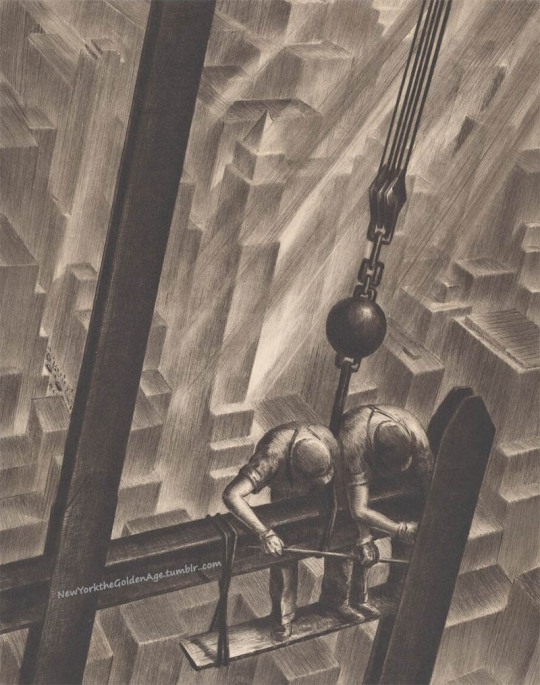
Samuel L. Margolies, Men of Steel, ca. 1939. Drypoint.
Photo: patrons.org
#vintage New York#1930s#Samuel L. Margolies#construction workers#drypoint#heights#art#working#labor#workers#Men of Steel#vintage Manhattan#vintage NYC
43 notes
·
View notes
Text

The House Committee on Labor and Industrial Relations advanced the child labor bill, House Bill 156, along with HB119, which would slash from 26 to 20 weeks the amount of time for which people can receive unemployment benefit payments. A third bill the committee approved would change the way workers' compensation wages are calculated in ways that could limit benefits received by some injured workers.
First-term state Rep. Roger Wilder, R-Denham Springs, who sponsors the child labor measure and owns Smoothie King franchises across the Deep South, said people have been too critical of his bill.
“The wording is ‘we’re here to harm children.’ Give me a break," he says. "These are young adults.”
Other Republican-controlled state Legislatures have similarly moved in recent years to weaken child labor regulations.
Remember, Republicans are so evil they eclipse satire.
26 notes
·
View notes
Text
Job interview tip I got from a tiktok but it's genius:
If you were unemployed for a while, they're going to ask if you can explain the gap in your resume. Unless you were actually doing something cool & relevant, this is hard to answer in a way that makes you sound like a good corporate cog. So here's the best and infallible answer -
No you cannot, because you signed an NDA.
You now sound mysterious, desirable, worldly, experienced. They can't even really ask you more about it! Perfect.
#obviously it is morally correct to lie on job applications/at interviews#level that playing field any way you can#employment#labor#job interview tips
45K notes
·
View notes
Text
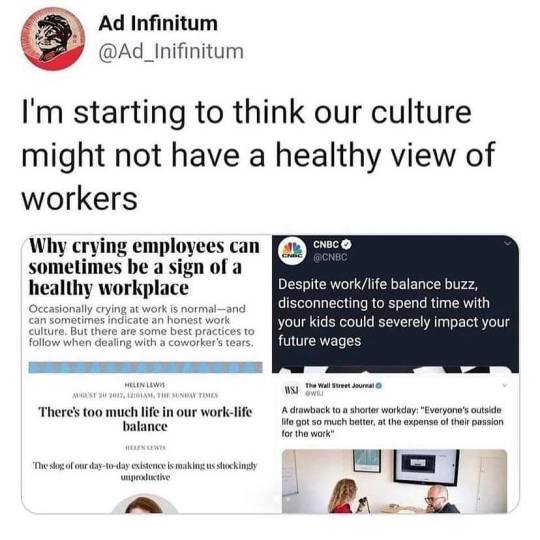
36K notes
·
View notes
Text
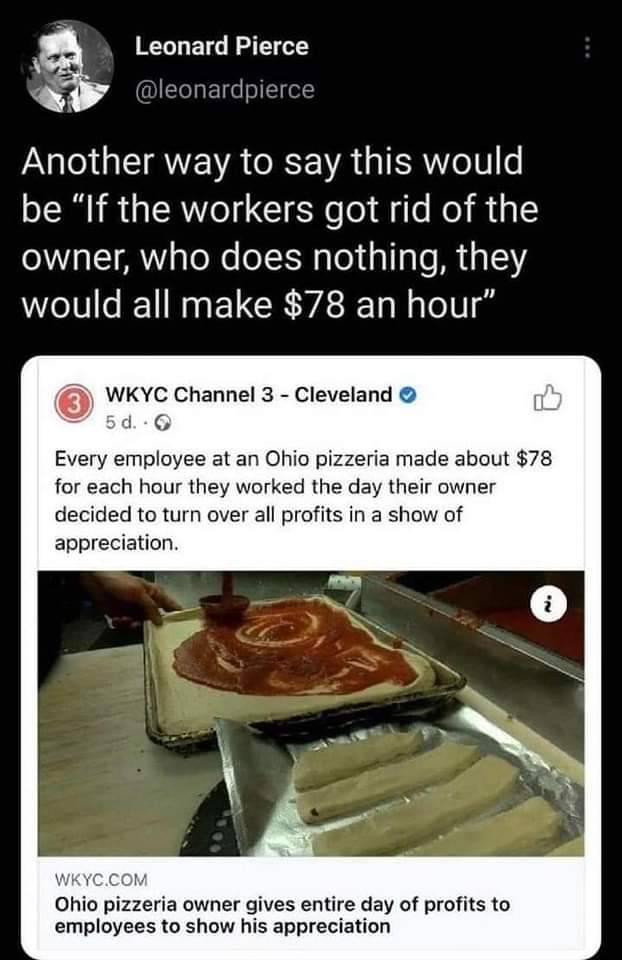
Stuff like this radicalizes me. How is this the best system we have?
67K notes
·
View notes
Text


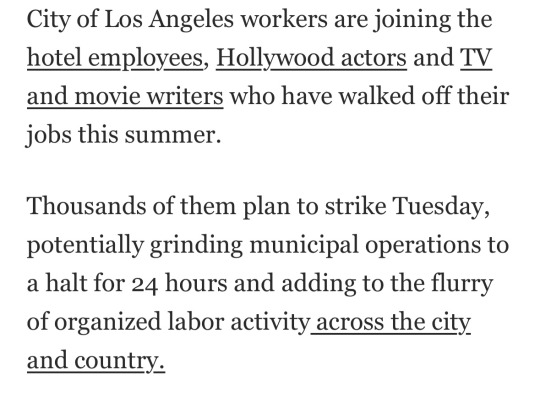
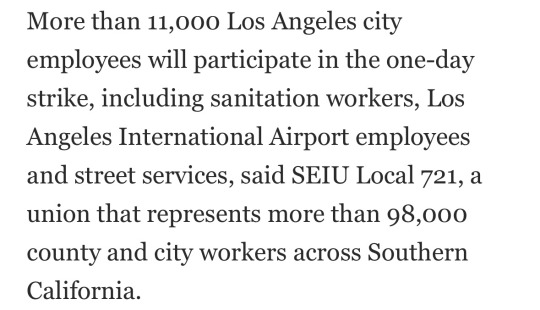
Source
Let’s go
#unions#unionize#labor#workers#workers rights#solidarity#capitalism#California#government#the left#progressive#current events#news
19K notes
·
View notes
Photo

#tweet#tweets#twitter#pixar#workers rights#workers vs capital#workers#labor vs capital#labor rights#labor#capitalism is a scam#toy story#toy story 2
33K notes
·
View notes
Photo

41K notes
·
View notes
Note
Hi- er, this is my first-ever writer's strike, how does one not cross a picket line in this context? I know how not to do it with things like Amazon and IRL strikes, but how does it apply to media/streaming?
Hi, this is a great question, because it allows me to write about the difference between honoring a picket line and a boycott. (This is reminding me of the labor history podcast project that's lain fallow in my drafts folder for some time now...) In its simplest formulation, the difference between a picket line and a boycott is that a picket line targets an employer at the point of production (which involves us as workers), whereas a boycott targets an employer at the point of consumption (which involves us as consumers).
So in the case of the WGA strike, this means that at any company that is being struck by the WGA - I've seen Netflix, Amazon, Apple, Disney, Warner Brothers Discovery, NBC, Paramount, and Sony mentioned, but there may be more (check the WGA website and social media for a comprehensive list) - you do not cross a picket line, whether physical or virtual. This means you do not take a meeting with them, even if its a pre-existing project, you do not take phone calls or texts or emails or Slacks from their executives, you do not pitch them on a spec script you've written, and most of all you do not answer any job application.
Because if this strike is like any strike since the dawn of time, you will see the employers put out ads for short-term contracts that will be very lucrative, generally above union scale - because what they're paying for in addition to your labor is you breaking the picket line and damaging the strike - to anyone willing to scab against their fellow workers. GIven that one of the main issues of the WGA are the proliferation of short-term "mini rooms" whereby employers are hiring teams of writers to work overtime for a very short period, to the point where they can only really do the basics (a series outline, some "broken stories," and some scripts) and then have the showrunner redo everything on their lonesome, while not paying writers long-term pay and benefits, I would imagine we're going to see a lot of scab contracts being offered for these mini rooms.
But for most of us, unless we're actively working as writers in Hollywood, most of that isn't going to be particularly relevant to our day-to-day working lives. If you're not a professional or aspiring Hollywood writer, the important thing to remember honoring the picket line doesn't mean the same thing as a boycott. WGA West hasn't called on anyone to stop going to the movies or watching tv/streaming or to cancel their streaming subscriptions or anything like that. If and when that happens, WGA will go to some lengths to publicize that ask - and you should absolutely honor it if you can - so there will be little in the way of ambiguity as to what's going on.
That being said, one of the things that has happened in the past in other strikes is that well-intentioned people get it into their heads to essentially declare wildcat (i.e, unofficial and unsanctioned) boycotts. This kind of stuff comes from a good place, someone wanting to do more to support the cause and wanting to avoid morally contaminating themselves by associating with a struck company, but it can have negative effects on the workers and their unions. Wildcat boycotts can harm workers by reducing back-end pay and benefits they get from shows if that stuff is tied to the show's performance, and wildcat boycotts can hurt unions by damaging negotiations with employers that may or may not be going on.
The important thing to remember with all of this is that the strike is about them, not us. Part of being a good ally is remembering to let the workers' voices be heard first and prioritizing being a good listener and following their lead, rather than prioritizing our feelings.
28K notes
·
View notes
Text
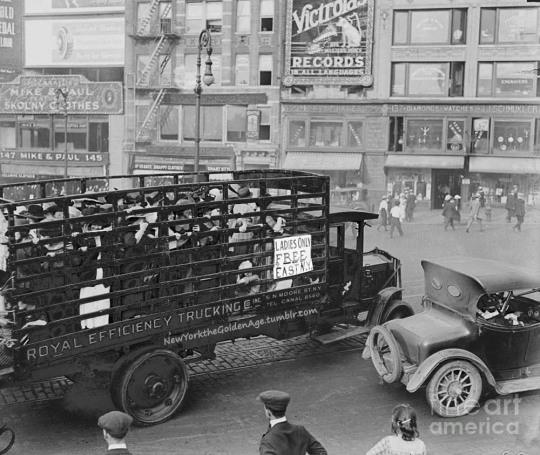
A jitney truck carrying female workers from the city to East New York, NJ, during a labor strike in 1921.
Photo: Bettmann Archive/Getty Images/Fine Art America
23 notes
·
View notes

